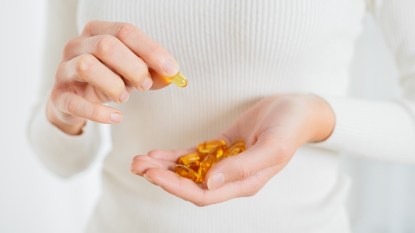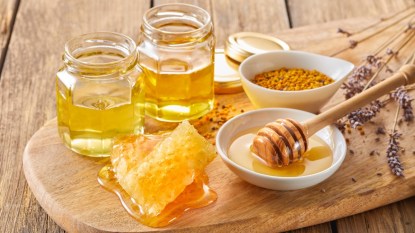The Best Tea for a Sore Throat? Docs Reveal Their Top 6 Picks That Soothe Fast
Find out why experts say herbal brews are your best bet, and the sweet spoonful that nixes hoarseness

Try as we might to stay healthy (especially during sick season!), now and then we all get sidelined by pesky hassles like a sore throat. The raw, scratchy feeling paired with painful inflammation can make swallowing difficult and leave your voice hoarse. The worst part? Depending on the underlying cause, symptoms can last for a week or longer. You’ve likely heard that a warm cup of tea helps soothe symptoms naturally. But that may leave you wondering what tea is good for a sore throat?
While it’s true that most brews are beneficial, experts say you’ll maximize the benefits by tailoring to your tea to your specific needs. Here, discover the six best teas for a sore throat, plus the delicious add-in that amplifies the healing powers.
What causes a sore throat?
A sore throat is one of the most common acute health problems. It causes throat pain, inflammation and/or irritation.Your symptoms may be mild and last for a few days, while other times they can be severe and make routine activities like speaking and eating difficult.
Viral illnesses, including the common cold and influenza, are the number one cause of sore throats. The reason? They can trigger postnasal drip, or a buildup of mucus at the back of the throat that leads to irritation. (Click through to see our best runny nose cures.)
Other common causes of a sore throat:
- Asthma
- Bacterial infections (like strep throat)
- Allergies
- Gastroesophageal reflux disease (GERD)
- Dry mouth
- Sleeping with your mouth open
- Overusing your voice
- Exposure to irritants such as smoke or pollution
- Dry air
What makes tea good for a sore throat
Cozying up with a comforting cup of hot tea is a time-honored way to soothe a sore throat, says Sonali Ruder, DO, an ER doctor and trained chef known as The Foodie Physician. And when it comes to healing brews, herbal teas are typically your best bet. They “provide even more relief than other fluids by reducing throat inflammation, coating the lining of the throat and helping to clear mucus,” she explains.
Dr. Ruder adds that many herbal teas also contain antioxidants, molecules that prevent cell damage and slow aging. Some even have antimicrobial properties that help fight off the viruses and bacteria causing an infection, she adds.

‘True’ tea vs. herbal tea
“True” teas, like your typical black or green brews, can soothe a sore throat. But you’ll get more powerful relief by opting for an herbal brew instead. The difference between the two:
“Herbal teas aren’t considered ‘teas’ because they don’t come from the same plant as real teas do,” explains Cal Orey, best-selling author of The Healing Powers of Tea. “Tisanes or ‘non-teas’ come from different parts of a plant, including the bark, flowers, leaves, roots, seeds and stems.”
The benefit of tisanes or herbal brews is that they contain organic compounds that boast immunity-boosting and anti-inflammatory properties. That makes them the ideal natural remedies to ease throat pain as well as reduce swelling and inflammation.
What tea is good for a sore throat?
The best tea for a sore throat depends on the underlying cause and the severity of your symptoms. All warm liquids sooth sore throats, but certain ingredients are more effective at fighting infection and inflammation than others. Here’s what our experts recommend:
1. For a virus, sip elderberry tea
Elderberry tea is made from the tiny, richly hued berries of the elder tree. It has a tart flavor similar to blueberries and pairs well with spices like cinnamon and clove. Dr. Ruder says that elderberry tea is packed with polyphenols, anthocyanins and flavonoids that “offer a powerful boost to your immune system, helping to fight off invading germs.”
Research backs this up. A study in the journal Nutrients found that folks who took elderberry extract had less severe cold and flu symptoms and recovered faster than those who didn’t take it.
“Virus-related sore throats, such as those caused by the cold, flu, and COVID-19, respond well to herbal teas like elderberry,” agrees Carmelita Lombera, RDN, a registered dietitian with Consumer Health Digest. “The warm steam helps to loosen up congested airways and help you feel better. Elderberry tea also contains phenolic compounds that have antimicrobial and antiviral effects.” In other words, they fight the virus so you heal quicker.
One to try: Buddha Teas Organic Elderberry Tea (Buy from Amazon, $7.73).
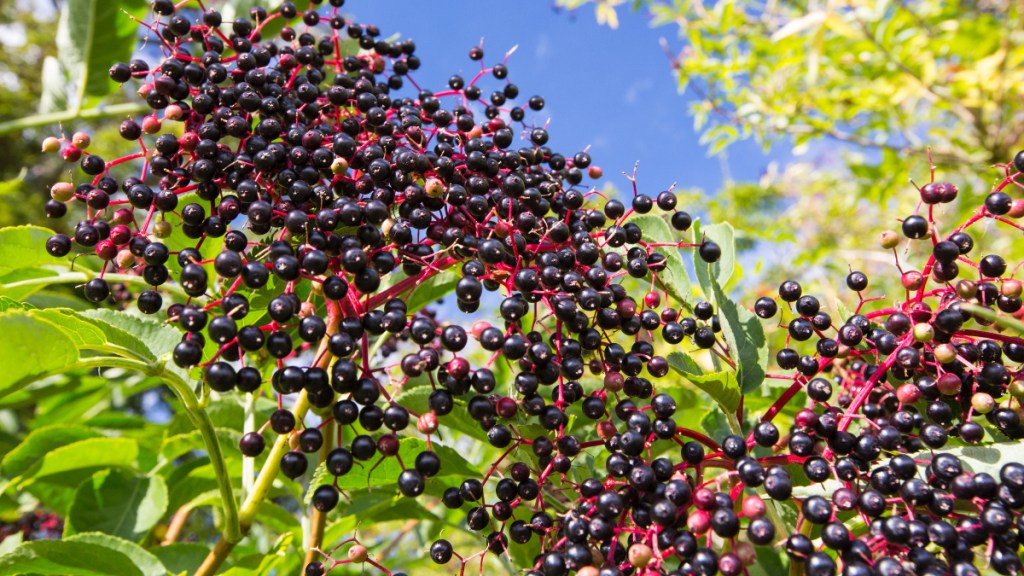
2. For a cold, sip lemon tea
If you’re bogged down by the common cold, a lemon-infused brew can soothe your symptoms. “Lemon tea is packed with vitamin C which is great for fighting off a cold and sore throat,” explains Mira Calton, CN, co-author of The Micronutrient Miracle. Orey agrees, noting that lemon tea contains “mighty flavonoids that may help fight sore throats due to inflammation.”
Relaxing with a lemon cuppa may even speed up your recovery. Research shows that vitamin C consumption shortens the time people are sick, putting you on the fast track to feeling like your usual healthy self again. (Click through for more benefits of drinking lemon water.)
One to try: Twinings Lemon and Ginger Herbal Tea (Buy from Amazon, $12.02).
3. For inflammation, sip green tea
Remember how we said herbal teas are generally better at treating sore throats than true teas? Green tea is the exception to that rule. That’s because it contains several plant-based compounds that have antioxidant and anti-inflammatory properties, Dr. Ruder says. “The specific polyphenol responsible for many of these effects is called epigallocatechin-3-gallate, or EGCG,” she adds. “EGCG has anti-inflammatory effects that help reduce throat inflammation, providing symptomatic relief.”
Even better? “Green tea is packed with vitamins and minerals and helps fight illness,” says Jason Calton, PhD, co-author of The Micronutrient Miracle and a Fellow of the American Association of Integrative Medicine. “Some studies have even shown that gargling green tea can help ward off sore throats.” It’s true! Research in Anesthesia and Pain Medicine confirms that gargling with green tea reduces the prevalence and intensity of sore throats. (Click through to learn how green tea stops bleeding gums, helps with bloat and helps get rid of a stye, too.)
One to try: Yogi Super Antioxidant Green Tea (Buy from Amazon, $15.96).
Related: Matcha vs Green Tea: Experts Settle the Debate on Which Is the Healthier Brew
4. For strep throat, sip licorice root tea
Licorice root tea, also known as sweet root tea, is made from the root of the licorice plant. It has a unique fennel-like flavor that pairs well with a cinnamon stick or an orange peel. And it’s the ideal soothing sip if you’re suffering from strep throat.
“Licorice root fights the bacteria that cause infections like strep throat,” explains Lombera. “One study found that licorice root reduced S. pyogenes bacteria, the microorganism that causes strep throat, within 12 hours of exposure.”
Like many of the other teas on our list, Lombera says licorice root’s benefits can be attributed to its plethora of phytochemicals that help fight inflammation and kill bacteria cells. But Dr. Ruder says one of these compounds stands out from the rest: Glycyrrhizin. “It’s the primary active compound in licorice root,” she notes. “It has anti-inflammatory properties and may help reduce irritation and inflammation in the throat.” (Click through to learn why licorice tea is one of the best teas for headaches and a top tea for allergies, too.)
One to try: Traditional Medicinals Organic Licorice Root Herbal Tea (Buy from Amazon, $9.98).
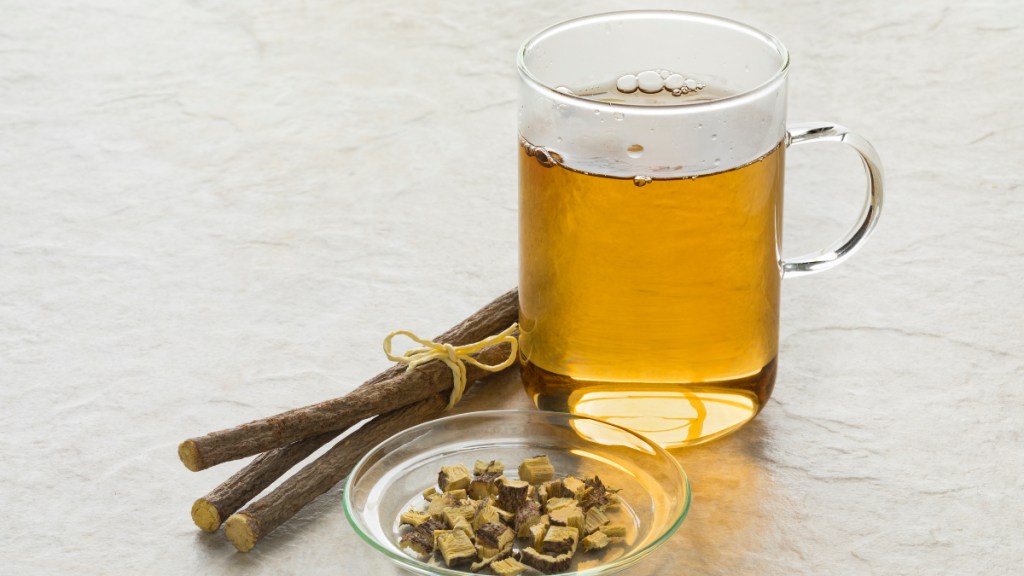
5. For coughing, sip chamomile tea
If your sore throat is caused by (or worsened by) a stubborn cough, chamomile tea can help. “This tea contains antioxidants and also has anti-inflammatory benefits,” Mira Calton says. “As a bonus, it can also minimize the amount you cough,” since it acts as an antispasmodic.
Dr. Ruder agrees, adding that chamomile tea is naturally soothing and has anti-inflammatory properties to help reduce swelling from a sore throat. Since chamomile also promotes relaxation, it’s the perfect brew if you want a cozy drink before bed. (Click through to learn more about how chamomile can help you fall asleep.)
One to try: Celestial Seasonings Chamomile Herbal Tea (Buy from Amazon, $7.76).
6. For allergies, sip slippery elm tea
Slippery elm is a tree native to North America. Indigenous peoples have used its bark in herbal remedies for hundreds of years, and for good reason. The mildly sweet, earthy plant contains a unique compound called mucilage that quells throat soreness caused by allergies and other irritants.
“Mucilage turns into a slick gel when mixed with water,” explains Dr. Ruder. “It creates a protective coating in your throat, thus soothing the symptoms of a sore throat” caused by physical irritants such as pollen, smoke or pollution. Tip: Interested in another option? Dr. Ruder says marshmallow root tea has similarly high levels of mucilage. (Click through to see the best natural ragweed allergy relief remedies.)
One to try: Palm Beach Herbals Slippery Elm Tea (Buy from Amazon, $19.95).
How much tea you should drink to ease a sore throat
Lombera says it’s safe to drink two or more cups of herbal tea daily if you have a sore throat. “Most herbal teas contain less than 1 milligram of caffeine per cup,” she adds, so you don’t have to worry about them keeping you up at night or making you feel anxious. If you choose a tea blend that contains caffeine, try to limit it to three cups or less per day. That’s especially true if you take prescription medications like calcium channel blockers, for example, that can interact with caffeine.
The sweet stir-in that boosts the benefit
Whatever brew you’re sipping, you can make it even more potent by adding a spoonful of naturally antibacterial honey. The kitchen staple gently coats your throat, shielding it from irritation. Indeed, research in the National Journal of Physiology, Pharmacy, and Pharmacology found that folks with sore throats who consumed honey recovered quicker than those who didn’t savor the sweet spoonful. (Click through to learn how lemon and honey calms a cough.)
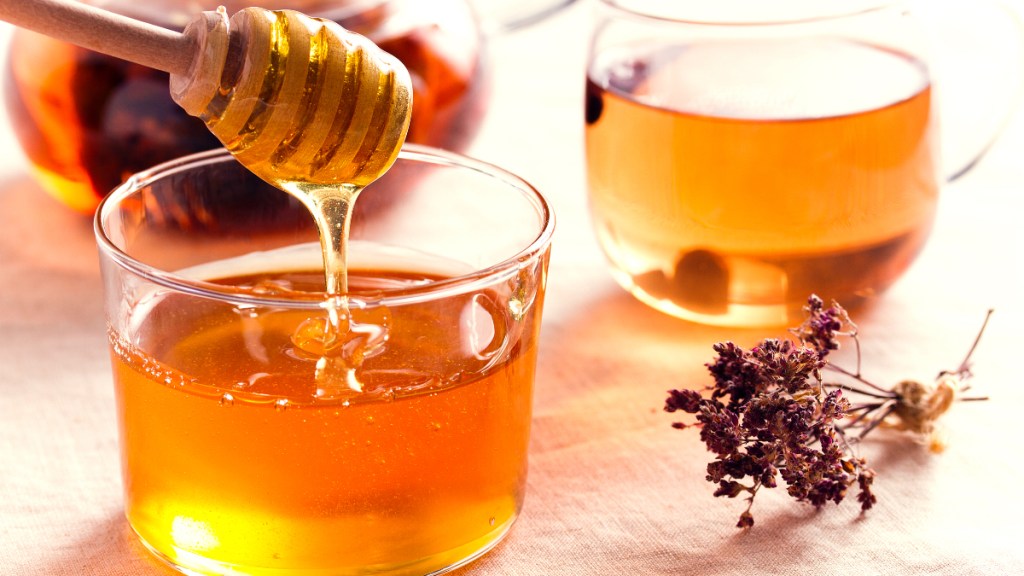
Orey says she’s experienced honey’s soothing benefits first-hand. “Whenever I’m a guest on national radio, I often take a tablespoon of honey with anti-inflammatory chamomile before I go on air,” she says. “It takes away the hoarseness — usually due to allergies or talking too much — and my voice sounds soothing without the cackle.”
Related: This Honey Can Help Women Ease Hot Flashes, Boost Libido + More
For more healing teas:
Fennel Tea Can Ease Bloat, Calm Stress + Boost Sleep — How to Brew It for Pennies
Could This TikTok-Trendy Tea Be the Next Superfood? What to Know About Chaga
This content is not a substitute for professional medical advice or diagnosis. Always consult your physician before pursuing any treatment plan.



